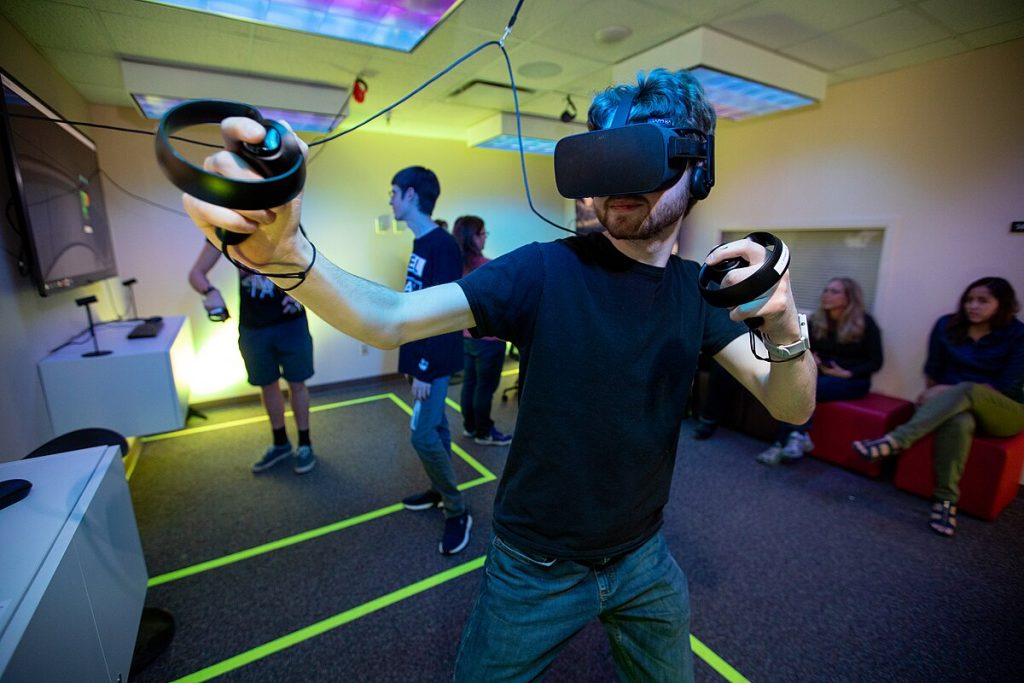Virtual reality (VR) is revolutionizing the gaming industry, creating immersive experiences that transport players into fantastical worlds and interactive narratives. By allowing users to engage with games in a three-dimensional environment, VR has transformed the way we play, interact, and experience digital entertainment. This article explores the impact of VR on gaming, its applications, benefits, challenges, and future potential.
Applications of VR in Gaming
Immersive Gameplay: VR enables players to step inside the game, providing a first-person perspective that enhances engagement. Users can physically interact with the virtual environment, making gameplay more dynamic and realistic.
Example: In VR titles like “Beat Saber,” players use motion controllers to slice through musical blocks, creating a physically engaging experience that traditional gaming cannot replicate.
Enhanced Storytelling: VR allows for innovative narrative experiences, where players can explore stories from multiple perspectives and interact with characters in a way that traditional media cannot offer.
Case Study: Games like “Half-Life: Alyx” use VR to create rich, immersive worlds where players can influence the story through their choices and actions.
Social Interaction: VR gaming has evolved into a social experience, where players can interact with friends and others in virtual spaces. Multiplayer VR games enable collaborative and competitive play, enhancing community engagement.
Example: Platforms like “VRChat” allow users to create avatars, socialize, and participate in various games and activities within a shared virtual environment.
Training and Simulation: Beyond entertainment, VR is used in training simulations for various professions, including military, medical, and industrial applications, allowing individuals to practice skills in a safe, controlled environment.
Benefits of VR in Gaming
- Increased Immersion: VR provides a level of immersion that enhances player engagement. The ability to look around and interact with the environment makes gaming experiences feel more real and captivating.
- Physical Activity: Many VR games encourage physical movement, promoting a more active gaming experience. This can lead to improved fitness and well-being, as players engage their bodies while playing.
- Innovative Gameplay Mechanics: VR introduces new gameplay mechanics that leverage the technology’s capabilities. Players can manipulate objects, navigate through spaces, and solve puzzles in ways that were previously impossible.
- Unique Emotional Experiences: The immersive nature of VR can elicit strong emotional responses from players, making them feel more connected to the characters and storylines. This emotional engagement can lead to memorable experiences.
Challenges of Implementing VR in Gaming
Despite its transformative potential, the integration of VR in gaming faces several challenges:
- Cost of Equipment: High-quality VR headsets and motion tracking systems can be expensive, limiting access for many players. Affordability remains a barrier to widespread adoption.
- Motion Sickness and Discomfort: Some users experience motion sickness or discomfort while using VR, which can hinder the gaming experience. Developers need to address these issues to create more comfortable experiences.
- Content Development: Creating compelling VR games requires significant investment and expertise. Many smaller studios may struggle to produce high-quality VR content due to limited resources.
- Fragmented Market: The VR gaming market is still evolving, with various platforms and technologies. This fragmentation can make it challenging for developers to create universally compatible games and for players to choose the right equipment.
The Future of VR in Gaming
The future of VR in gaming holds exciting possibilities, with ongoing advancements likely to enhance its applications:
- Integration with Augmented Reality (AR): The convergence of VR and AR can lead to hybrid gaming experiences that blend virtual and real-world elements. This fusion can create innovative gameplay mechanics and immersive storytelling opportunities.
- Advancements in Hardware: As technology improves, we can expect more affordable, lightweight, and user-friendly VR headsets that provide enhanced graphics and performance, making VR gaming accessible to a broader audience.
- Cross-Platform Experiences: Future developments may enable cross-platform play, allowing VR gamers to connect with players using traditional gaming setups, fostering a more inclusive gaming community.
- Expanded Game Genres: As VR technology matures, we can expect a wider range of game genres, from educational experiences to complex role-playing games, broadening the scope of what VR gaming can offer.
Conclusion
Virtual reality is reshaping the gaming landscape by providing immersive, interactive experiences that redefine how players engage with digital content. While challenges remain, the potential benefits of VR in gaming are substantial. As technology continues to advance, VR has the power to enhance gameplay, foster social connections, and create unforgettable experiences for gamers around the world.


